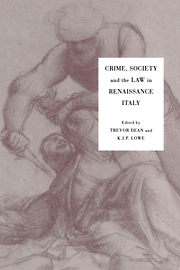Book contents
- Frontmatter
- Contents
- Illustrations
- List of contributors
- Preface
- 1 Writing the history of crime in the Italian Renaissance
- 2 Criminal justice in mid-fifteenth-century Bologna
- 3 The judicial system in Florence in the fourteenth and fifteenth centuries
- 4 The incidence of crime in Sicily in the mid fifteenth century: the evidence from composition records
- 5 Theology, nature and the law: sexual sin and sexual crime in Italy from the fourteenth to the seventeenth century
- 6 Practical problems in the enforcement of Italian sumptuary law, 1200–1500
- 7 The prince, the judges and the law: Cosimo I and sexual violence, 1558
- 8 Intervention by church and state in marriage disputes in sixteenth- and seventeenth-century Florence
- 9 The writer and the man. Real crimes and mitigating circumstances: il caso Cellini
- 10 The political crime of conspiracy in fifteenth- and sixteenth-century Rome
- 11 Fighting or flyting? Verbal duelling in mid-sixteenth-century Italy
- 12 Banditry and lawlessness on the Venetian Terraferma in the later Cinquecento
- 13 Mihi vindictam: aristocratic clans and rural communities in a feud in Friuli in the late fifteenth and early sixteenth centuries
- Index
7 - The prince, the judges and the law: Cosimo I and sexual violence, 1558
Published online by Cambridge University Press: 14 October 2009
- Frontmatter
- Contents
- Illustrations
- List of contributors
- Preface
- 1 Writing the history of crime in the Italian Renaissance
- 2 Criminal justice in mid-fifteenth-century Bologna
- 3 The judicial system in Florence in the fourteenth and fifteenth centuries
- 4 The incidence of crime in Sicily in the mid fifteenth century: the evidence from composition records
- 5 Theology, nature and the law: sexual sin and sexual crime in Italy from the fourteenth to the seventeenth century
- 6 Practical problems in the enforcement of Italian sumptuary law, 1200–1500
- 7 The prince, the judges and the law: Cosimo I and sexual violence, 1558
- 8 Intervention by church and state in marriage disputes in sixteenth- and seventeenth-century Florence
- 9 The writer and the man. Real crimes and mitigating circumstances: il caso Cellini
- 10 The political crime of conspiracy in fifteenth- and sixteenth-century Rome
- 11 Fighting or flyting? Verbal duelling in mid-sixteenth-century Italy
- 12 Banditry and lawlessness on the Venetian Terraferma in the later Cinquecento
- 13 Mihi vindictam: aristocratic clans and rural communities in a feud in Friuli in the late fifteenth and early sixteenth centuries
- Index
Summary
In both international and Italian historiography, the sixteenth century in Italy has for a long time been considered as a period of sharp decline. This idea, rather discouraging for historical studies, has been applied with particular emphasis to Florence after the end of the republic and the establishment of the principality. 1530 has often, and even recently, been considered a crucial break in the history of the city, as well as in that of Italian states in general, a break which marks the end of the Renaissance.
It would be easy, in effect, to prove that there are also deep continuities in Florentine history through the fifteenth and the sixteenth centuries. However, if we set aside the idea of decline, it may be more interesting to turn our attention to the political change taking place in the city with the establishment of the principality. Asking which political principles the prince tried to comply with in superimposing his rule on the republican and civic tradition, and which problems he had to face, may offer an opportunity for meaningful comparison between the two different systems of government. Hence, the case of Florence may also contribute to a more general discussion about the different ways justice was conceived and practised, and public order was pursued, in different political frameworks during the Renaissance.
Here I will confine myself to presenting a limited number of questions relating to this subject through a case study.
- Type
- Chapter
- Information
- Crime, Society and the Law in Renaissance Italy , pp. 121 - 141Publisher: Cambridge University PressPrint publication year: 1994



